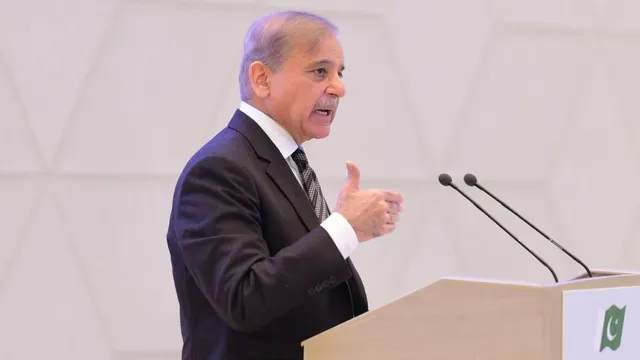- By Ajeet Kumar
- Wed, 13 Aug 2025 09:17 AM (IST)
- Source:JND
Pakistan Prime Minister Shehbaz Sharif on Tuesday claimed that any attempt to stop the flow of water into Pakistan is in violation of the Indus Waters Treaty, and would be met with a "decisive response". Addressing an event in Islamabad, he said: "Enemy [India] can't snatch even a single drop of water from Pakistan."
He said, "You threatened to stop our water. If you attempt such a move, Pakistan will teach you a lesson you will never forget." PM Shehbaz emphasised that water was a lifeline for Pakistan, and no compromise would be made on the country's rights under international agreements, as per Geo News.
Former World Bank President Eugene Black initiated the talks. Recognised as one of the most successful international treaties, it has endured frequent tensions, including conflict, and has provided a framework for irrigation and hydropower development for over half a century.
He said, "You threatened to stop our water. If you attempt such a move, Pakistan will teach you a lesson you will never forget." PM Shehbaz emphasised that water was a lifeline for Pakistan, and no compromise would be made on the country's rights under international agreements, as per Geo News.
Shehbaz Sharif warns India of “serious consequences” if the Indus Water Treaty is touched… because in Pakistan’s worldview, water is off-limits but exporting militants is fair game.
— Mariam Solaimankhil (@Mariamistan) August 12, 2025
Four threats in 48 hrs from 4 men reading the same ISI script. Islamabad’s version of water… pic.twitter.com/DwXV9hbsPn
Following the Pahalgam terrorist attack in April, which killed 26 people, India has, in exercise of its rights as a sovereign nation under international law, placed the Indus Waters Treaty (IWT) in abeyance until Pakistan credibly and irrevocably abjures its support for cross-border terrorism.
ALSO READ: Is Pakistan Capable Of 'Taking Half The World Down'? A Look At Islamabad's Nuclear Arsenal
What is Indus Water Treaty?
The Indus Waters Treaty was signed in 1960, following nine years of negotiations between India and Pakistan, with the assistance of the World Bank, which is also a signatory.
Former World Bank President Eugene Black initiated the talks. Recognised as one of the most successful international treaties, it has endured frequent tensions, including conflict, and has provided a framework for irrigation and hydropower development for over half a century.
ALSO READ: Is Trump Developing Strong Bond With Pak Army Chief At Expense Of His Relationship With PM Modi? US Responds
Former US President Dwight Eisenhower described it as "one bright spot in a very depressing world picture that we see so often."
The Treaty allocates the Western Rivers (Indus, Jhelum, Chenab) to Pakistan and the eastern rivers (Ravi, Beas, Sutlej) to India. At the same time, the Treaty allows each country certain uses of the rivers allocated to the other. The treaty gives India 20 per cent of the water from the Indus River System and the rest 80 per cent to Pakistan.
The IWT was in the spotlight in the aftermath of the Pulwama attack in 2019. The Treaty has been criticised for being too generous to Pakistan, even when it has continued to promote terror in India.
Former US President Dwight Eisenhower described it as "one bright spot in a very depressing world picture that we see so often."
The Treaty allocates the Western Rivers (Indus, Jhelum, Chenab) to Pakistan and the eastern rivers (Ravi, Beas, Sutlej) to India. At the same time, the Treaty allows each country certain uses of the rivers allocated to the other. The treaty gives India 20 per cent of the water from the Indus River System and the rest 80 per cent to Pakistan.
The IWT was in the spotlight in the aftermath of the Pulwama attack in 2019. The Treaty has been criticised for being too generous to Pakistan, even when it has continued to promote terror in India.
(With inputs from agency)

